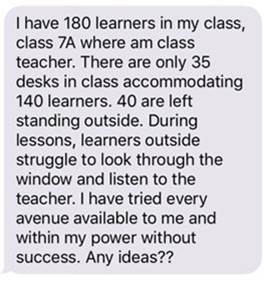Can mobile phones improve the quality of education for refugee children?
An innovation developed and tested at the Kakuma refugee camp, Kenya, showed that mobile phones can help refugee teachers improve their teaching practice.
The need for better education is critical in recovery efforts.
Globally, over 60 million people have been forced to flee their homes – leaving behind their schools, jobs and communities.
Refugee children and youth urgently need quality education that will help them heal and grow, protect them from further harm, and disrupt the ongoing cycle of violence and poverty.
However, teachers in many refugee camps in Africa typically receive minimal or no teacher training, and many only have secondary school certificates and their own educational experiences to draw on. If they do receive training, it is often in the form of one-off workshops delivered by visiting NGOs.
In light of the growing refugee crisis, new solutions to delivering educational services are urgently needed.
FCA tests new innovation to support teachers
In 2015, Teachers College – Columbia University (TC) and Finn Church Aid (FCA) joined forces for the Amplify Refugee Education Challenge, a global competition funded by DFID and developed by IDEO, UNICEF, and UNHCR.
In November 2015, FCA and TC launched a prototype of a new educational innovation in the Kakuma refugee camp, host to over 100,000 refugees, in northern Kenya.
The prototype was designed to answer the question: How can mobile phones – already widely used by refugees – be leveraged to provide support to refugee teachers?
Twenty refugee teachers were selected to participate, and over a two-week period, teachers received instructional strategies, pictures, and motivational quotes that were linked to the intensive teacher training they had received four months earlier in Kakuma. Teacher education experts based in Nairobi, London, and New York participated in WhatsApp discussions with the refugee teachers.
Prototype reveals enormous potential but also limitations

Question from one of the refugee teachers in the discussion group.
The prototype yielded a higher response rate and more positive results than expected.
Teachers reported that M-Mentoring had a significant impact on their ability to translate their training to practical hands-on solutions in the classroom. Some teachers even reported that they were so inspired by the messages and discussions that they engaged teachers in their own schools in discussions on how to address the challenges they face in practice.
“I hope that the programme will continue to expand and improve…and that in 2016 there will be more opportunities to make us better people, better teachers, better agents of change. Because you have really been giving us hope…We are all humans, and that is what you people have recognised”, told one of the teacher participants in Kakuma.
Teachers also reported that the ability to engage in discussion with each other and with education specialists internationally reduced the deep sense of isolation they feel in refugee camps, and even fostered a sense of a global education community.
Despite the unexpected success of the prototype, teachers cautioned that this initiative would only be successful if closely connected to in-person training and mentoring support.
In 2016, FCA and TC are partnering to implement a second phase of the prototype, with continued support from Amplify-DFID. The goal is to develop and test a more robust service, that links in-person coaching, training, and M-Mentoring in the most effective and sustainable way.